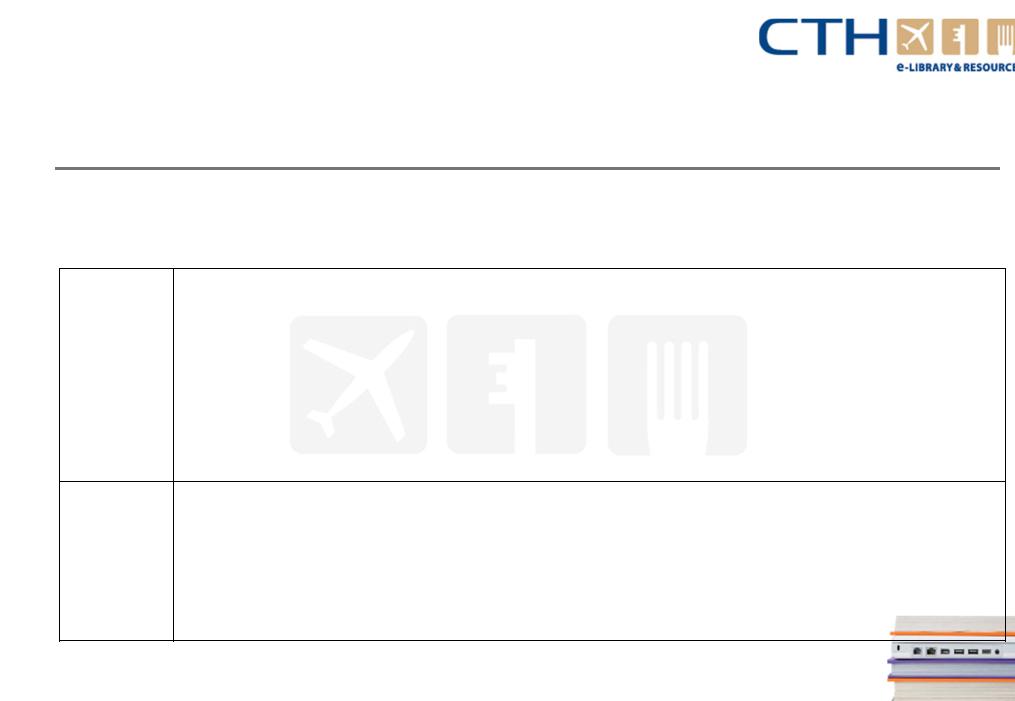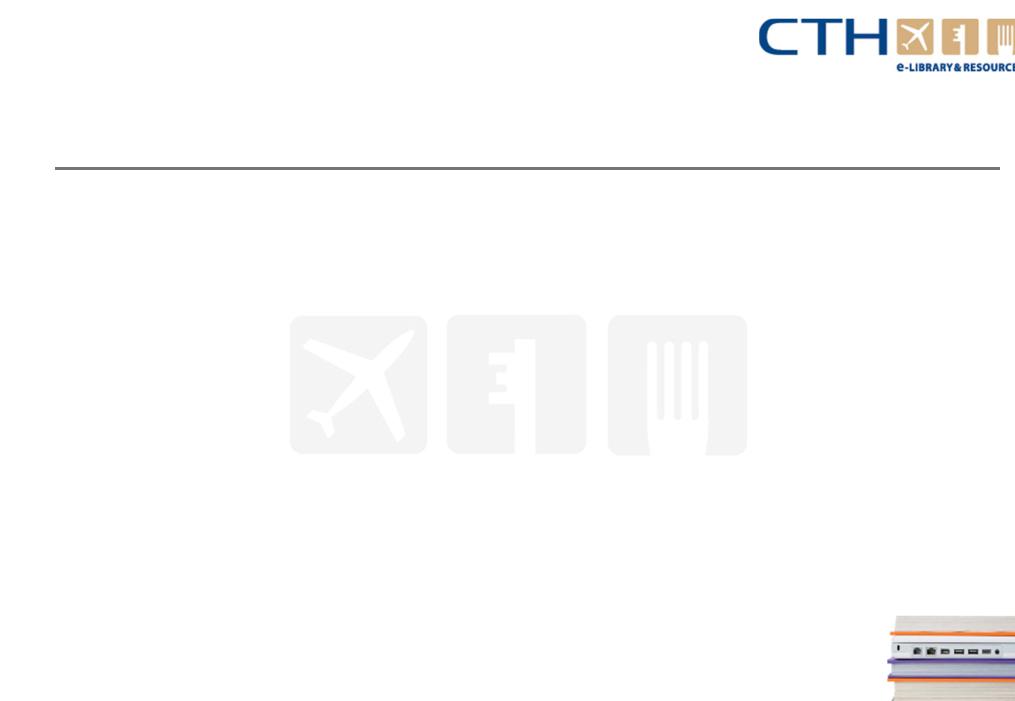
Front_Office_Operations
.pdf
Chapter 7– Security and safety responsibilities
Security aspects of hotels
3.1 Dimensions of security
Security of data
People may seek to sabotage or steal information from organisations for:
●Fraud or theft: e.g.. stealing guests credit card or identifying details, in order to perpetrate credit fraud; or stealing security access codes, computer passwords or banking/delivery schedules in order to plan thefts, espionage or robbery.
●Commercial purposes: e.g.. stealing confidential reports or plans from the hotel for use by competing hotels (commercial espionage); or stealing guest data for sale to other hotels or marketing agencies
●Pure nuisance value: e.g.. a disgruntled employee or computer hacker sabotaging the hotel s computer systems with a virus or inaccurate information.
www.cthresources.com |
Page 401 |
|
www.cthawards.com |

Chapter 7– Security and safety responsibilities
Security aspects of hotels
3.2 General principles of security
Generally speaking, effective security is a combination of delay, checking and alarm
Delay |
Lines of defence before vulnerable areas a items can be reached |
●Staffed reception area through a entrants must pass
●Areas clearly marked 'Staff Only’
●Locked front door if reception IS unattended a night
●Lockable or staffed offices (e.g.. where cash. data and valuables are kept)
●Lockable filing cabinets, safes and deposit boxes
●Password-protected computer records
●Advising guests not to leave belongings unattended
Checking Procedures for authorised access to vulnerable areas or items
●Verifying guest identities at check-in and payment
●Checking guest credit-worthiness or ability to pay
●Challenging people who are in unauthorised areas or behaving suspiciously
●Using passwords and key codes for access to computers, rooms
●Checking authorisation for charged expenses etc
www.cthresources.com |
Page 402 |
|
www.cthawards.com |

Chapter 7– Security and safety responsibilities
Security aspects of hotels
3.2 General principles of security continued…
Generally speaking, effective security is a combination of delay, checking and alarm
Alarm |
Procedures for alerting those responsible for responding to security breaches |
|
●Electronic security alarms and front desk alarm call buttons |
|
●Protocols for front office to call security officers or police |
|
●Computer warnings of unauthorised data access attempts |
|
●Individual alertness and awareness of security issues |
www.cthresources.com |
Page 403 |
|
www.cthawards.com |

Chapter 7– Security and safety responsibilities
Security aspects of hotels
3.3 Who is responsible for security in a hotel?
All hotel staff, and guests and visitors, will need to take some responsibility for looking after the security of their own belongings, being vigilant about suspicious packages or behaviour, using security measures and procedures (such as locking room doors at night etc.
A large hotel might have dedicated security staff, or general responsibility for security may be allocated to the premises manager or duty manager. Front office staff need to know exactly whom to call in case of suspicious activity, a report of theft or violence, unauthorised access to data or areas of the hotel etc.
The security role of front office staff
Front office has a key role in security because:
●It is the area through which most people enter and leave the hotel.
●Front office staff are most likely to recognise legitimate guests and visitors by sight, and therefore to be able to identify suspicious people wandering round the hotel.
www.cthresources.com |
Page 404 |
|
www.cthawards.com |

Chapter 7– Security and safety responsibilities
Security aspects of hotels
3.3 Who is responsible for security in a hotel? Continued…
●Deals directly with guests and other Visitors, and may therefore get a 'sense of the potential for security problems (e.g.. guests intending to skip out without paying; guests operating illegal activity (drug dealing or prostitution) in the hotel; potential thieves purporting to be visitors or contractors).
●Front office staff handle cash, credit cards and other payments, accounting records, equipment, room keys, guest valuables and guest and hotel data. They are therefore
(a)responsible for their security
(b)vulnerable to robbery
(c)open to temptation to commit theft and fraud themselves
(d)able to contribute significantly to the improvement of general security in the hotel, through vigilance and the following of security procedures.
www.cthresources.com |
Page 405 |
|
www.cthawards.com |

Chapter 7– Security and safety responsibilities
Security aspects of hotels
3.3 Who is responsible for security in a hotel? Continued…
It is also important to recognise the limits of your responsibility for the security of the hotel‘ You will need to find out what your personal responsibilities are - and where they stop.
Follow the rules that affect your own behaviour directly.
●If you see doors, windows, filing cabinets or cash boxes left open (or unlocked if they are supposed to be locked) when an area is unattended: close lock them.
●If you have keys to a filing cabinet or safe, or the password to a computer, use them responsibly and keep them safe.
●Obey all the hotel's security warnings, checks and procedures: these may relate to handling cash and valuables; verifying guest identity; checking the validity of payments; challenging suspicious visitors; notifying security about unidentified luggage or packages etc.
www.cthresources.com |
Page 406 |
|
www.cthawards.com |

Chapter 7– Security and safety responsibilities
Security aspects of hotels
3.3 Who is responsible for security in a hotel? Continued…
Notify another appropriate person if you become aware of a security problem outside your authority or capability to deal with.
●The premises manager or maintenance staff may need to be notified of doors, windows or locks that need fixing.
●Suspected security breaches or problems (e.g.. suspicious visitors or packages, or evidence of theft, vandalism or data exposure) should be reported to officers with the authority to initiate appropriate response measures. The front office should maintain a register of all anticipated types of incidents and the action to be followed in each case: when to inform internal security staff, when to call the local police station, and when to hit the emergency alarm button for emergency police assistance.
●If other staff do not appear to know or adhere to security procedures, you may need to draw their attention to them tactfully. If breaches continue, you may need to approach their supervisor.
www.cthresources.com |
Page 407 |
|
www.cthawards.com |

Chapter 7– Security and safety responsibilities
Security aspects of hotels
3.4 General hotel security procedures
It is easy for front office staff to have a lapse in concentration: (e.g.. leaving a cash drawer open and turning away in the presence of an unknown member of the public). It is easy to get used to work a particular way that you stop asking questions: is the person asking for the key to room 102 really entitled to it?
3.5 Suspicious packages or bags
In addition to telephoned or mailed bomb threats (which mayor may not be a hoax, but will need to be handled as a serious risk), front office staff will need to be vigilant about: unattended and/or 'out of place' items left in public areas, which may contain some form of incendiary or explosive device; and suspicious mail packages.
www.cthresources.com |
Page 408 |
|
www.cthawards.com |

Chapter 7– Security and safety responsibilities
Security aspects of hotels
3.5 Suspicious packages or bags continued…
If you become suspicious about an item, or one is reported to you, first ensure the safety of people. Do not attempt to touch, move or check the item – and advise others not to do so
●Remain calm - and advise others to do so. Panic may be almost as dangerous as the item itself - or more, if your suspicions turn out to be groundless
●Ask other staff whether the item is recognised and when it was first noticed: it may be possible to identify the owner before the incident escalates further
●Report the matter to the duty manager or internal security staff immediately: there should be a clear protocol for such notifications. The responsible person should take the decision to call the police
●If possible, move people away and block off the area, without causing alarm: a pretext (such as closure for maintenance or cleaning) may be used, if necessary
●The duty manager, security officer or police (if involved) may decide to evacuate the area or building, in which case emergency evacuation procedures (explained earlier) will be applied
www.cthresources.com |
Page 409 |
|
www.cthawards.com |

Chapter 7– Security and safety responsibilities
Data privacy protection
4.Data and privacy protection
4.1The data protection Act
4.2Protecting guest privacy
www.cthresources.com |
Page 410 |
|
www.cthawards.com |
